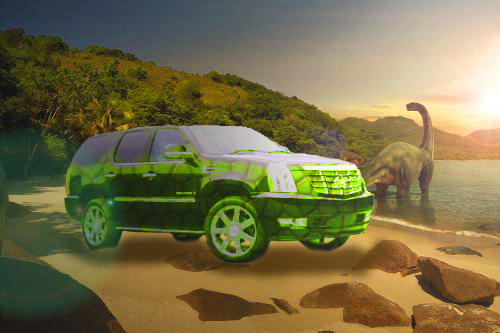Opinion: Alternative Fuels And The Trek Across The Highwire
NAFA Communications Assistant Donald W. Dunphy looks at a time when alternative-powered vehicles could have gained dominance, if only the SUVs hadn't ruled the earth.
On September 19, ethanol futures dropped for a fifth day as crude oil declined on speculation demand is waning. Crude dropped on concern Greece won’t qualify for enough financial aid for it to avoid default.
The highwire act of instituting a new energy source and actually getting it to, figuratively, catch fire balances two forces; the sky above is the price of the current go-to energy source which, in this case, would be oil and gasoline. The ground below is a disastrous economy. Only the highwire will lead the aerial walker to the right direction, where there's enough money to indulge in changes, but not enough to suffer the status quo. Other than the wire, it is merely varying degrees of "splat."
Example: The prime time for any alternative fuel or alt-powered vehicle is when the price of oil is so prohibitively high, people will do anything to beat the high cost of driving. However, that same public still has to have a certain amount of disposable income to attempt any major personal economic investments, or more succinctly, to buy stuff they don't know about. This is extremely difficult to do when the price of oil is low, not solely because people, when given the chance to stick with the cheap "old faithful" or to take a leap of faith, tend to stick.
The reason why the price of oil commonly gets driven down is because OPEC sees a lack of consumers, mostly due to poor economic futures, the specter of a recession or, (breathe deep), double-dip recession. Industry can't buy oil industry can't afford, and so it doesn't. There's no incentive to keep the price high. On the contrary, the price drops so sales can be facilitated.
Just as there's no incentive to buy up oil, there's often little to no money for consumers to go mucking about with. As political mayhem and Wall Street implosions and explosions scatter all about, is anyone naive or idealistic enough to go racking up debt for new technology's vehicles? With a national unemployment rate at the nine-percent mark, can consumers even dream of consuming, much less acting upon impulses? Sure, they've heard promising things from ethanol, from electric vehicles, and a whole host of new concepts outside of the borderline, but if an EV parks in the forest and nobody can afford to hike up there to get it, does it really exist?
The tightrope is that golden mean between high oil price but some kind of confidence between the world economic structure and the structure of the numbers in your bank account. You might ask if such a magical time ever existed, and I certainly think it did: it was in the mid-1990s when the great, fat Sport Utility Vehicle roamed the earth, terrorizing small children and sub-compacts, squashing deer at every turn, and coming in second to no one, not even the wily Velociraptor. This behemoth existed for two reasons primarily:
One, it was a mighty status symbol. It said, "I have so much money, I don't really care how much gas costs. If I could blow up an oil well to prove how macho-rich I am, I'd do that instead. This is just the next best thing."
Two, a bluff is a bluff. Gas was cheaper. Oil was cheaper. It was still costly to show off, but not as costly as it could have been. And then it was.
That tipping point where SUV and luxury vehicle owners still maintained their machines, yet knew it wasn't to last much longer, was the perfect time to start getting the alt-fuel parade of wire-walkers moving. There was money to invest in that next big thing, it would have reflected a sheen of first-adopter status, and the rising price of oil and gas would make it a smart move too. All the strands hewed together into a tensile-strong cord leading to that mythic other side.
The problem was that innovation then wasn't where it is now: the EV was a concept car that got environmentalists excited but hardly anyone else and those prototypes looked more like pimples off the face of a bigger, more interesting car. Were we to find ourselves in such a golden period again today, I'm confident there would be many more traversing that territory between heaven and earth, between the scream and the splat.
For now though, as the eyes of the world turn to Greece, birthplace of the greatest of the philosophers, dramatists, and (uh, well) Yanni, we wait to see if their credit crises and possible default tank the Euro, sending the shockwave down the cord to the whole of Europe, over to the banks that fund them, of which the rest of the globe has a sizable stake, and down to the oil-producing nations that have no choice but to drag out the markdown gun, and shake us all off our perch to that most democratic of splats ever.
Hang on tight, everyone. This ain't no cakewalk.
 What's your opinion? Join the discussion of this and other fleet and auto-related topics. Visit LinkedIn and find the NAFA Fleet Management Association page to weigh in.
What's your opinion? Join the discussion of this and other fleet and auto-related topics. Visit LinkedIn and find the NAFA Fleet Management Association page to weigh in.
The opinion expressed is solely of the writer's and does not necessarily represent the viewpoint of NAFA Fleet Management Association.


 What's your opinion? Join the discussion of this and other fleet and auto-related topics. Visit LinkedIn and find the NAFA Fleet Management Association page to weigh in.
What's your opinion? Join the discussion of this and other fleet and auto-related topics. Visit LinkedIn and find the NAFA Fleet Management Association page to weigh in.